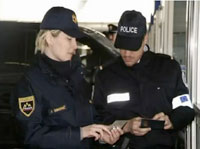World Social Forum in Tunis 2015: Input about the EU border angency Frontex
During the World Social Forum in Tunis Afrique-Europe-Interact has organised together with other migrationrelated organisations a workshop about a campaign against Frontex. The long version of the input which has been made by Conni Gunßer of the refugee counsil in Hamburg and Afrique-Europe-Interact can be downloaded here.
The workshop was announced with the following text: Push back Frontex! No more left-to-die cases at sea!
After the end of “Mare Nostrum” and the launch of the Frontex operation “Triton” in the Central Mediterranean Sea, there is an ongoing power struggle between the Italian navy and coastguard on one hand and Frontex on the other, concerning rescue operations beyond the 30 miles zone off the Italian coast. Frontex director Klaus Rösler openly called for a termination of rescue operations near the Libyan coast, which, in fact, means leaving people in distress to die in this area as the Libyan coastguard does currently not exist. We want to launch a short-term campaign against this policy of Frontex, the murderous EU border regime and for the rescue of all boatpeople!
Frontex - the Movie 2.0

New version of the FRONTEX film – produced by the transnational campaign Frontexplode : Apart from general informations about the daily work of Frontex, the film also includes the actions against FRONTEX on the greek island of Lesvos and during their “birthday party” in Warsaw.
Frontex – the driving force in the war against Boatpeople and Sans Papiers
Sea operations, EuroSUR and new border technologies
5 years ago in May 2005, Frontex, the European border agency, started its work with a few pilot projects. Today, Frontex is permanently involved in militarized sea- and land-operations against refugees and migrants on the European border as well as in the coordination of charter-deportations. Frontex is the driving force on different levels intensifying the repressive system of migration-control even beyond EU-borders.
Frontex – an agency for deportation?
One of the tasks Frontex is known for is the “interception” of migrants by joint patrols and operations at the EU borders. But one of the main problems is: What will EU member states do with the “intercepted” migrants? It is not so easy to push them back to the non-EU country where they are coming from if there is no readmission agreement, especially concerning transit migrants. Also there is criticism from human rights organizations that any “refoulement” of migrants, who could be “real” refugees/ asylum seekers, is illegal (see the latest decision of the anti-torture-commission of the Council of Europe against deportations to Libya by joint patrols with Italy). To send migrants back to countries of origin is often even more difficult, if they have no documents and/or there is no readmission agreement. And deportations by plane are expensive and often lead to resistance, not only from deportees, but also from passengers and members of the crew.
EU migration politics in Westafrica
By all included
Each night Spanish navy ships set sail out of the Dakar, Senegal, harbour hunting for boat refugees which are attempting to reach the Canary Islands. Frontex is actively patrolling the West-African seas since 2006 within the framework of the Joint Operation HENA up to 1300 kilometers from the Southern-European coast.



